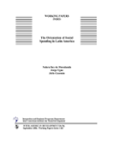The Orientation of Social Spending in Latin America
Date
Sep 2006
The orientation of social spending is a decisive element for the creation and allocation of opportunities for all because it reveals, to some degree, the priorities and relative importance a government assigns to directly and indirectly tackling poverty, inequality and their consequences. Paradoxically, there are only a few studies that analyze the orientation of social spending by socioeconomic groups in Latin America. The present study tries to solve this, presenting and analyzing the incidence of social spending on education, health, and social security for the majority of Latin American countries in order to understand how State actions contribute to providing for the needs of the poorest groups of the population. This study concludes that only five of the 11 countries under examination had progressive social expenditures; furthermore, the pace of change seems to be very slow. Although there are some positive trends - for example, spending in primary education - social spending in secondary education, tertiary education, and social security and pensions are highly regressive, even more than expected. This creates a greater sense of urgency in the region to deal forcefully with the issue of equity in social spending.



